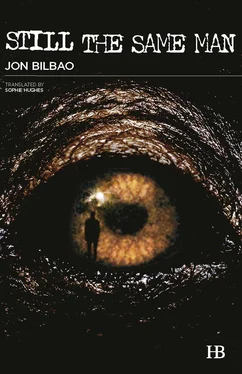The scene was so dismal that Joanes preferred to keep his mouth shut. He didn’t want to overstress the place’s obvious deficiencies, and he guessed from the others’ silence that they felt the same. The darkness and the storm only intensified the poor impression the cabin made on them. Joanes forced himself to see it another way, with new eyes — with a little sweep of the floor and some sunshine, the place wouldn’t be so bad. The walls were painted a pistachio color, and on the upper part, skirting the ceiling, some well-intentioned if poorly skilled person had begun to draw a decorative border of vines and tropical birds.
The professor held up his wife, while Joanes turned the mattress, hoping — in vain — to find fewer stains on the other side, and then spread one of the blankets over it.
“You can lie down now,” he told the woman.
The professor put her down on the bed. Afterward, he lit the oil lamp and, carrying the lamp and his luggage, took himself off to the bathroom to put on a dry change of clothes.
“The hotel room was a positive suite compared to this,” said the woman once she and Joanes were alone.
He kicked away the garbage around the foot of the bed. A blanket of dead cochineals — their shells parched and curled into little balls — crunched under the soles of his feet. On the floor, the flashlight lit up a V shape of dust and grime, over which a rust-colored millipede was crawling. Joanes remembered the chronicles he’d read of the conquistadors, which told of flies that bit people inside their noses and ears, bites that would later become infected and swell up terribly, and of worms that crawled onto sleeping people at night and burrowed through their eyelids and eyes.
He shook these thoughts from his head.
“It’s not so bad,” he replied. “I’d imagined some shed that the wind would rip apart piece by piece. This seems solid, at least.”
He took off his rain jacket and patted himself dry with one of the blankets.
“We should have stayed at the hotel,” said the professor’s wife. “Whatever the cost.”
Joanes said nothing.
“You don’t think a tree could fall on us?” she asked.
“Not windy enough.”
When the professor came back from the bathroom, he was carrying a metal bucket, which was swinging by its handle from one of his fingers.
“I found this. Whoever was here before used it to make a fire. We could do the same.”
He had a point. The hurricane had made the temperature drop. The woman, who was wrapped up in one of the blankets, was shivering.
“Here, indoors?” she asked. “Won’t the smoke asphyxiate us?”
“There are too many air currents for that,” answered her husband.
Someone had pierced holes in the bucket to help the fire catch. It was black with soot, and the base was covered in a dark, gritty residue. Joanes and the professor surveyed the trash around the cabin, searching for something that would burn. They decided on the boards that were strewn across the floor. They propped them up diagonally, resting one end on the floor and the other against the wall, and then stamped on them so they snapped in the middle. They kept going until they had a decent amount of firewood.
Joanes placed the bucket near the bed and added the smallest pieces of wood to it.
“It’s too damp,” said the professor. “It’ll need something else if it’s going to catch.”
There was nothing suitable in the cabin. Joanes opened his backpack and pulled out the notebook where he’d made his notes about the reduction to the hotel offer the night before. He tore off a few blank pages, scrunched them into balls, and put them inside the bucket, under the sticks of wood. He held a lighter to them. The wood resisted. Joanes was forced to go on tearing out pages until he reached those where his notes were written. He tore them out, too. At last, the wood caught fire. It let off a load of smoke, and the residue at the bottom of the bucket gave off an acrid stench as it melted. But the fire gave them light and heat. The professor turned off the flashlight.
The three of them watched the flames in silence.
In spite of the cabin, the hurricane, and the exhaustion, Joanes was pretty pleased with himself. He’d shown conviction. He was sure that nobody expected that when the hotel owner told him get out, his response would be a cool “fine by me.” He felt a certain degree of pride at spending the night in that place, in the middle of the wilderness and a Category 2 or even Category 3 hurricane.
He thought about the telephone call he’d been waiting for all day. There in the cabin, in the thick of night, surrounded by the whistling wind, all of that seemed a million miles away. And then, as he watched the fire, he realized with absolute certainty that the call was never going to come, that he would never supply air conditioning to that hotel. To his surprise, it didn’t bother him in the slightest. He told himself that his business would survive. And if that wasn’t the case, well, that didn’t matter, either, because he’d find a way to keep going.
As soon as he’d warmed himself up a bit, he moved away from the professor and his wife. With the intention of catching a few winks, he sat down on the floor with his back against one wall, stretched his legs, and closed his eyes.
He imagined himself adrift in the waters of the Caribbean, lying on a piece of driftwood, a fragment of some vessel or another. He was exhausted, on the brink of passing out. He’d spent hours at the mercy of the waves and currents. He could hardly keep his head above the surface.
Then an island appeared. It was very close, but until that moment he hadn’t been able to see it. The current gently drove him toward it. He was escorted by a flock of shrill seagulls flying above him.
The waves left him on a deserted beach. His legs could barely support the weight of his body when he set foot on the sand. He stumbled a few steps forward, just enough to reach the shade of a jungle of coconut trees, where at last he could collapse to the ground and give in to his tiredness. Coconuts thumping against the sand as they fell from the trees were the heartbeats of his sleep. Red crabs scurried around with pincers raised, like frightened Lilliputians, not daring to touch him.
“Did you two hear that?” asked the professor’s wife.
Her husband, who was sitting on the floor next to her, looked at her wearily. Joanes opened his eyes. They couldn’t hear anything other than the wind and the rustle of the vegetation outside.
“It was probably a branch snapping,” said the professor.
“It wasn’t a branch. It sounded like something metallic. Like jangling.”
They listened again, but couldn’t hear anything like jangling.
“It could have been anything. The wind dragging along some—” began Joanes.
But he was interrupted by a noise coming from outside. Sure enough, it was a metallic jangling. It sounded close. Next thing they knew, they heard a deep, masculine voice ordering someone to keep walking and then reassuring him, saying, “We’re here now.”
A moment later, the door rattled. Someone had pushed it from the outside.
“What the fuck!”
More blows came and almost brought down the door.
“Manco! Beluga! Are you in there?”
Inside, nobody said a word. They watched the door, their hearts beating hard in their chests.
“Open the door, you sons of bitches! Can’t you see it’s us? We’re going to drown out here!”
“Don’t open it,” the woman whispered to her husband. “If we keep quiet, they’ll go away.”
The professor tutted.
“They’re not going to go. They’ll see the fire.”
The shouting stopped suddenly, and the jangling sound came back, moving around the cabin. It paused in front of a window. Whoever was outside peered through a crack in the boards.
Читать дальше












